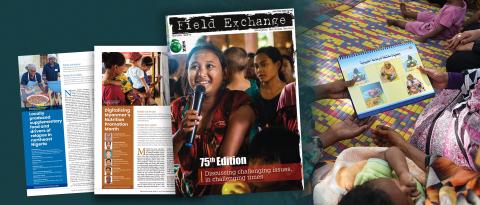A journey through Field Exchange: Marie McGrath’s reflections on over two decades of learning and impact
In her 22 years with Field Exchange, few individuals have contributed as significantly to its evolution as Marie. As she bids farewell to ENN and Field Exchange, she shared her reflections on a remarkable career that began as a sub-editor, grew through many highs and lows, and left enduring lessons for the publication’s future. Here we summarise the conversation with Marie, which you can hear in our accompanying podcast.
Marie’s journey with Field Exchange began in an unexpected manner. While writing an article on the challenges of conducting research during the Kosovo crisis (McGrath, 2000), she caught the attention of then-editor Jeremy Shoham. Impressed by her work, which required little editing, Jeremy offered her the opportunity to try her hand at sub-editing. Marie took the chance and never looked back. In 2002, when she was appointed co-editor and under Jeremy’s mentorship, she refined her editorial skills through a ‘learning-by-doing’ approach.
As a sub-editor and editor, she relished the art of storytelling, always keen to listen, learn, and document the experiences of nutrition practitioners. Marie found joy in helping authors craft accessible and engaging narratives. “Some people think they have nothing to contribute, but in reality, they hold invaluable knowledge,” she remarks. One of the aspects of Field Exchange that Marie valued most was its ability to foster openness about both successes and failures. “The real learning happens when people are honest about what went wrong as well as what went right,” she says. She recalls how some of the most impactful articles were those that candidly discussed programme failures and adaptations: “It’s a difficult thing to navigate putting pen to paper. Fair dues to those who were brave enough to write about their struggles. It’s where the true learning happens.”
Marie recalls a particularly memorable special issue focusing on government approaches to scaling up (Field Exchange Issue 43) community-based management of acute malnutrition. Co-hosted with Ethiopia’s Ministry of Health, this edition captured real-time perspectives from governments grappling with the issue, bringing Field Exchange to life.
Of course, the journey was not without its challenges. Tight deadlines, encouraging transparency, and navigating sector-wide debates were just a few. Issue 60 on continuum of care in acute malnutrition management even sparked debate by questioning UN agencies’ respective responsibilities. It stirred some controversy but ultimately led to meaningful discussions. “We’re not here to undermine the system,” Marie clarifies: “We’re here as constructive allies, highlighting gaps so they can be addressed.”
Her parting advice is simple yet profound: “Never underestimate the value of your learning. If something helped you, it will help someone else too.”
Marie’s legacy at Field Exchange is one of fostering connection, knowledge sharing, and fearless learning. As she moves on to new adventures, her impact will continue to resonate within the pages of Field Exchange—and in the minds of the countless professionals it has supported over the years.
References
McGrath M (2000) Infant Feeding in Emergencies: Recurring Challenges. https://www.ennonline.net/fex/10/en/infant-feeding-emergencies-recurring-challenges


